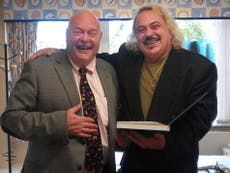Jeremy Hunt calls for investigation into renowned surgeon who ‘hoarded thousands of body parts over 25 years’
Leaked report claims Dr Derek McMinn kept the bones of at least 5,224 patients he operated on
Former health secretary Jeremy Hunt has called for an immediate investigation after a leaked report claimed that a world-renowned surgeon had hoarded body parts from thousands of patients over a 25-year period.
Dr Derek McMinn, who has performed surgeries on a number of celebrities, politicians and top athletes, kept the bones of at least 5,224 patients he operated on – despite having no licence to store body parts or proper consent from patients, according to the findings of the report seen by The Independent.
Nurses, theatre staff and doctors at the Edgbaston Hospital, in Birmingham, where Dr McMinn carried out the majority of his operations, were apparently aware of what he was doing.
Some hospital staff even helped put bones from patients in special pots to be preserved and collected by members of the surgeon’s team, according to the internal investigation by BMI Healthcare, which runs the hospital.
Dr McMinn’s apparent actions, which were initially kept from regulators, date back to the 1990s. The leaked report claims that he admitted to hospital bosses last year that he had been keeping patient bones at his seven-bedroom farmhouse in Worcestershire, as well as at his work premises in Birmingham.
The revelations raise further questions over safety and transparency measures within the private health sector, which found itself under scrutiny earlier this year following the Ian Paterson inquiry.
The jailed breast surgeon was found to have subjected more than 1,000 patients to unnecessary and damaging operations over 14 years before he was stopped.
Dr Paterson was free to perform harmful surgery on mainly female patients in NHS and private hospitals because of “a culture of avoidance and denial,” said the report, which called on ministers, NHS bosses and the private healthcare industry to introduce new measures to reduce the risk that another health professional could harm patients.
Mr Hunt, now chair of the Commons Health Select Committee, said the Dr McMinn case highlights the need for the government to deliver the recommendations outlined in the Paterson inquiry.
“This case looks concerning, and we need answers quickly,” he told The Independent.
“It shows once again why the government must get on with implementing the Paterson inquiry recommendations as a matter of urgency. We have heard this theme of staff not speaking up again and again, so we can not allow these recommendations to be kicked into the long grass."
David Rowland, director of the Centre for Health and the Public Interest, told The Independent: "Once again the private hospital business model - which places income generation above the interests of patients - has been exposed as a major safety risk.
“As in the Ian Paterson case, it appears that a private hospital company was prepared to turn a blind eye to the extremely serious misconduct of a powerful surgeon who would have generated huge amounts of revenue for them over the years.
“The fact that the company has only now notified the regulatory bodies of his actions a year after it knew about the full extent of them and has yet to tell the patients affected, shows that it may be more concerned with protecting its own commercial reputation than protecting patients from harm.
“If patients are to be properly protected a major review of the regulation of private hospitals is urgently needed.”
West Mercia Police have since confirmed that officers are investigating an alleged breach of the Human Tissue Act relating to “a private premises in Worcestershire” following a referral by the Human Tissue Authority.
The Care Quality Commission (CQC) was not made aware of the full extent of the McMinn case until last Friday, after The Independent had begun making inquiries.
Professor Ted Baker, the chief inspector of hospitals for the watchdog, said: “While we understand that BMI’s internal investigation incurred delays, it is disappointing that it has taken so long for the findings to be shared with us.”
He said the CQC would be reviewing the reports to determine whether further action was needed, while the General Medical Council has also asked for the investigation reports.
When approached by The Independent, Dr McMinn declined to comment.
A spokesperson for Circle Health Group, which took over BMI Healthcare in June this year, said the body “would like to apologise for this surgeon’s completely unacceptable and distressing actions in previous years”, adding: “We will leave no stone unturned in investigating these historic issues; they have all been reported to the appropriate authorities and we will cooperate closely with regulators to resolve them.”

Join our commenting forum
Join thought-provoking conversations, follow other Independent readers and see their replies
Comments